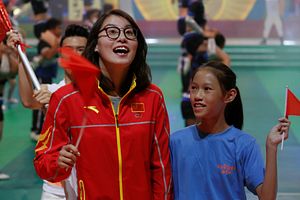Despite the ongoing political tensions between the ruling Chinese government and the people of Hong Kong, a delegation of 64 Chinese Olympians was welcomed to Hong Kong with applause and rapture. Dressed in yellow blazers for women, and red blazers for men, the athletes were greeted by Chief Secretary Carrie Lam Cheng Yuet-ngor and 180 visibly excited school children waving small Chinese and Hong Kong flags.
The charm offensive has become something of a tradition since the Sydney Olympics in 2000, with Chinese athletes visiting Hong Kong and Macau, post games. The tours have been touted by Chinese state media as a way of strengthening the bonds between China and its two prodigal cities. But not everyone got to see them, as there was no public parade.
The Olympic diving, table tennis, and badminton athletes put on a demonstration in the form of a kitschy variety show. There were 5,700 tickets released for the show at HK$20 each (US$2.50); however many scalpers looked to make a large profit, selling them for more than HK$1,000 (roughly $130).
Four-time Olympic champion diver Wu Minxia displayed her diving routine at Victoria Park swimming pool, while badminton star Chen Long played against former gold medalist Lin Dan. But by far the star of the show was Chinese swimmer and bronze medalist Fu Yuanhui, who won the hearts of Hong Kongers with her candid and humble interviews and entertaining gestures and expressions. At a press conference, Fu said that she loved Hong Kong and she had never dreamed of being so popular. She said Hong Kong and China “are family, like brothers and sisters,” and with her trademark animated expressions, said that she would be back — to visit Disneyland.
Leading up to the visit, there were fears that Hong Kong’s patriots would try to voice their cause and create problems, along with media attention. Metal barriers were erected and police patrolled the area around the athletes’ hotel, and two floors were fenced off to the public and other hotel guests. However, no protests or demonstrations were organized. The closest thing was one question from an Apple Daily reporter asking the athletes how they would respond if confronted with an anti-mainland protest in Hong Kong. The question was deflected, and Wang Wen, a mainland Chinese official, said that sports are not related to politics and the question was irrelevant to the purpose of the visit.
Hong Kong’s Chief Executive Leung Chun-ying met with the athletes at a reception at Government House and said that Hong Kongers and the national athletes were “bonded by blood” and Hong Kong hoped to work with the mainland to develop sports in the city, according to the South China Morning Post. In 2014, Leung was publicly slammed by Hong Kong’s Olympic athletes for his remarks about the sports sector not contributing to the economy.
The tour has been an apparent success for both governments and among the wider population of Hong Kong, an increasingly rare occurrence of cross-border goodwill.
“We already feel the fire-like passion of Hong Kong people. We are very touched and thrilled,” said Liu Peng, director of the State General Administration of Sports. He thanked the citizens who gave them a heartfelt welcome. “We are also grateful to Hong Kong people for their support to the country’s development in various aspects, including the sports industry … I wish Hong Kong a better future.”
































